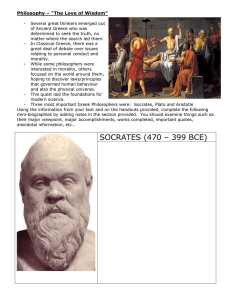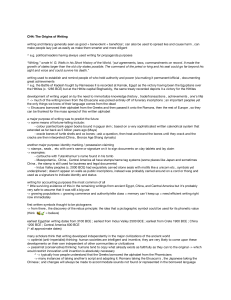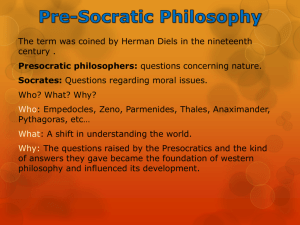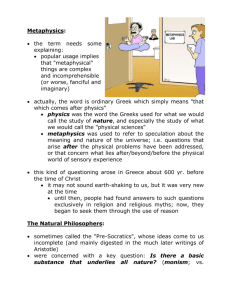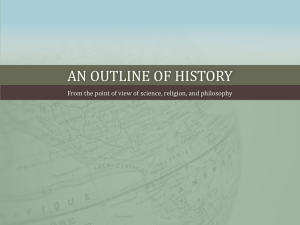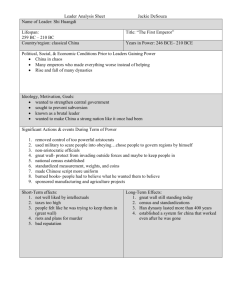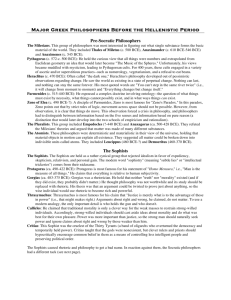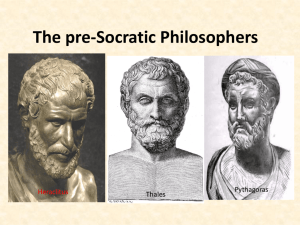Pre-Socratics
advertisement
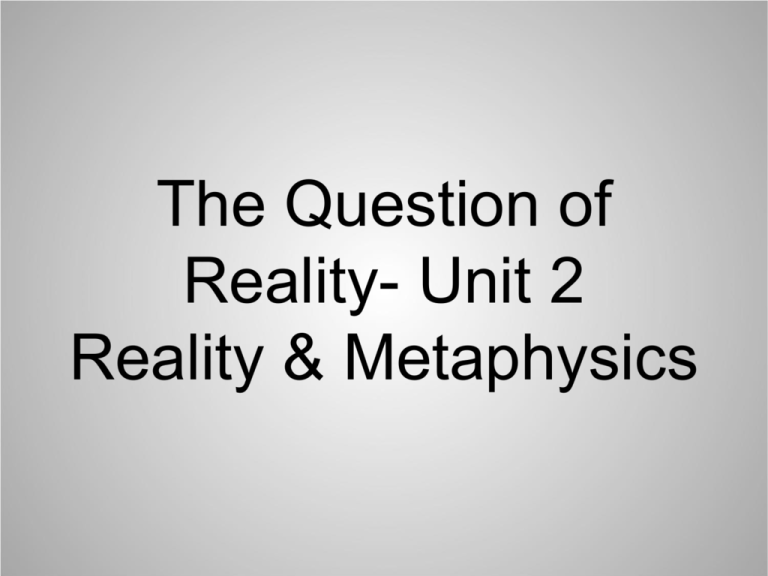
The Question of Reality- Unit 2 Reality & Metaphysics The Question of Reality • • • • What is reality? What is ultimate? What is really real? Read pp. 55-56 (Introduction) Chapter 3– The First Metaphysicians • The Problem of the One and the Many – What is the ultimate reality (the One)? – How is everything else (the Many) related to it? Presocratics • World’s first official philosophers • Sometimes called monists because they sought to isolate one thing (usually one of the elements) as the basic stuff to which all reality could be reduced • Their ancient efforts paved the way for the Scientific Method • Their ideas were literally written in stone • Pronounciation p. 60 Thales 624-546 BCE • • • • Water is the ultimate reality Necessary for all living things Is present in most things Seems to be everywhere (especially for a Greek) • There is a lot of it! • Can exist in different forms • Thought of as the 1st philosopher Anaximander 610-546 BCE • “All elements are comprised of ‘apeiron’ or ‘the boundless’” • All things are made of apeiron & return to apeiron • http://en.wikipedia.org/ wiki/Apeiron_(cosmolo gy) Anaximenes 585-528 BCE • “Air is the root of all things” • “The soul is composed of air” • The breath is linked to the soul (e.g. “Bless You” air leaving the body = soul leaving the body) Pythagoras 571- 497 BCE • Life is a numbers game • It can be explained through mathematical theorems (e.g. movement of planets, music, physics) • One of the first cult leaders killed followers who revealed his numerical secrets Heraclitus 536- 470 BCE • Everything is composed of fire • Also means everything is in flux • “You can’t step into the same river twice.” • “All things flow” • “The sun is new everyday” • “We are and we are not” • “All we are is dust in the wind, all we are is dust in the wiiiiii- iiiiiiiind….. Ahhhhhh ah ahhhhhh!!!” Parmenides 540 or 515-492 BCE • Opposite of Heraclitus everything is stagnant • “It is” • The more things change, the more they stay the same The Sophists • Sophists are the ancient version of selfhelp gurus or motivational speakers. • They were teachers & philosophers who charged money for their “wisdom” Protagoras • “The First Sophist” • “Man is the measure of all things” • Had an apathetic view of God • Followed the “anything goes” principle Gorgias • “The Nihilist” • Nothing exists • If anything did exist, you could not know about it • If something existed and you knew about it, you could not communicate that awareness to others Socrates • Compared himself to a gadfly (annoying to Athenians) • Wanted to find the TRUTH • Posed questions & then questioned the response others gave him (Socratic Method) • Never wrote his ideas down (couldn’t read or write) • We know about Socrates’s ideas through Plato’s accounts • Accused of corrupting the youth • Was put on trial, convicted, and sentenced to death Plato • Protégé of Socrates • Allegory of the Cave meant to illustrate how people live with a veil over their eyes • Can people respond to the TRUTH or one who has seen the TRUTH? • Theory of Forms perfect form of beauty, perfect form of numbers, cure for cancer, etc. • The Republic Most famous work; describes Plato’s perfect government system (philosophers rule– surprise, surprise) Aristotle • “Plato is dear to me, but dearer still is truth” • “Friendship is one soul living in two bodies” • He believed we have souls but they die with the body. Agree? • Too little or too much of anything is bad • Avoid extremes • Balance = harmony The Golden Mean • The cause of things is not just what happens as a lead up to an event, it is also a goal being realized (or a sense of purpose). It is as if the outcome is already there ahead of time, pulling reality along with it. • Also considered an attribute of beauty • Do you agree with this concept? Are there religious beliefs that match up with this concept? • Teleology: the study of the purpose of things PAGE 62 • Read the quotes in the green box on page 62 • You need a half sheet of paper to answer these questions: • Which do you agree with the most and why? 5 sentence minimum explanation. • Which one do you agree with the least & why (excluding Empedocles’s quote)? 5 sentence minimum explanation.
